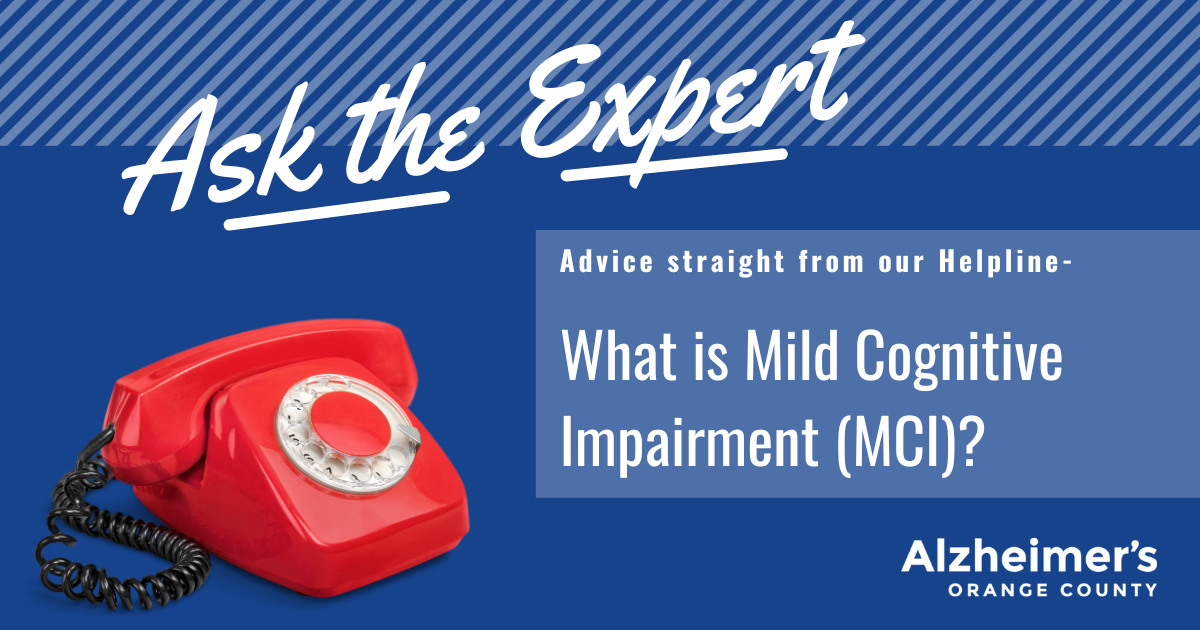As we age, we can experience changes in our physical and cognitive capabilities. However, some older adults have more memory or thinking problems than other adults at their age. This condition is called mild cognitive impairment (MCI). In Orange County over 164,000 people are living with dementia or MCI.
Currently, research has not indicated one single cause of MCI. As you get older, the risk of developing MCI can increase.
Symptoms of Mild Cognitive Impairment
The symptoms of MCI are often understated compared to Alzheimer’s disease or other types of dementia. For example, people living with mild cognitive impairment do not display personality changes or other problems commonly associated with Alzheimer’s disease. Unlike Alzheimer’s or dementia, people with MCI are still able to care for themselves and perform their normal daily activities.
Common signs of MCI are:
- Losing things often
- Forgetting to go to events or appointments
- Having more trouble coming up with words than other people of the same age
Mobility difficulties and problems with the sense of smell have also been linked to MCI.
How is Mild Cognitive Impairment Diagnosed?
Those around you may start to notice your memory lapses, which can cause worry about further memory loss. These worries may prompt you to see a doctor about your memory problems.
There are some instances where memory and thinking problems may be caused by conditions that are treatable. Doctors can perform tests and assessments to determine whether the source of memory problems is something treatable or may be MCI. Depending on the result, you may need to see a specialist for more tests.
Joe’s Story
Joe was almost 74. He was still working part-time. He noticed he was becoming more forgetful at work. He felt frustrated that it was so hard to find the right words to describe something. His boss told him that he missed a couple of meetings. He started to wonder if he had a serious problem.
Joe’s wife took him to get a complete health check-up. The doctor told Joe that he had mild cognitive impairment, also called MCI. The doctor said there was no treatment for MCI, but that he would keep a close watch on Joe’s memory and thinking skills. Joe felt better knowing there was a reason for his memory problems. To help deal with changes in his thinking, Joe used memory tools such as daily todo lists.
Living with Mild Cognitive Impairment
Since there is no standard treatment or approved medication for MCI, you can do some of the following activities to sharpen your memory and mental skills:
- Learn a new skill
- Follow a daily routine
- Plan tasks, make to-do lists, and use memory tools such as calendars and notes
- Put your wallet or purse, key, phone, and glasses in the same place each day
- Stay involved in activities that can help both the mind and body
- Volunteer in your community, at a school, or at your place of worship
- Spend time with friends and family
- Get enough sleep, generally seven to eight hours each night
- Exercise and eat well
- Prevent or control high blood pressure
- Don’t drink a lot of alcohol
- Get help if you feel depressed for weeks at a time
As a caregiver caring for someone with MCI, here are some ways you can take care of yourself:
- Ask for help when you need it
- Eat healthy foods
- Join a caregiver’s support group
- Take breaks each day
- Spend time with friends
- Keep up with your hobbies and interests. Get exercise as often as you can
- See your doctor on a regular basis
- Keep your health, legal, and financial information up-to-date
It is important to see a doctor every six to 12 months, to monitor the changes in your memory and thinking skills over time. Call our free Helpline to connect with one of our trained dementia care specialists that can answer questions, address concerns and connect you with additional resources. The earlier you seek support, the better. Keeping a personal record of any changes can also be helpful. If you have MCI, you can also consider enrolling in clinical trials or studies. Clinical trials are research studies that determine if a treatment, like a new drug, is safe and effective in people. People with and without memory problems can take part in clinical trials, which may help themselves, their families, or future generations.
Does Mild Cognitive Impairment Lead to Dementia?
Research has indicated that people with MCI tend to develop Alzheimer’s disease or related dementia when compared to those without MCI. It is estimated that 10% to 20% of people aged 65 or older with MCI develop dementia over a one-year period. However, not everyone living with MCI will develop Alzheimer’s disease or a related form of dementia. In many instances, the symptoms of MCI tend to stay the same or even improve.
Research has shown that genetics may play a role in who will develop MCI, as they also do in Alzheimer’s and related dementias. More studies and research are in progress to learn why some people living with MCI develop Alzheimer’s and others do not.
Additional Resources
Dementia Prevalence in Orange County


